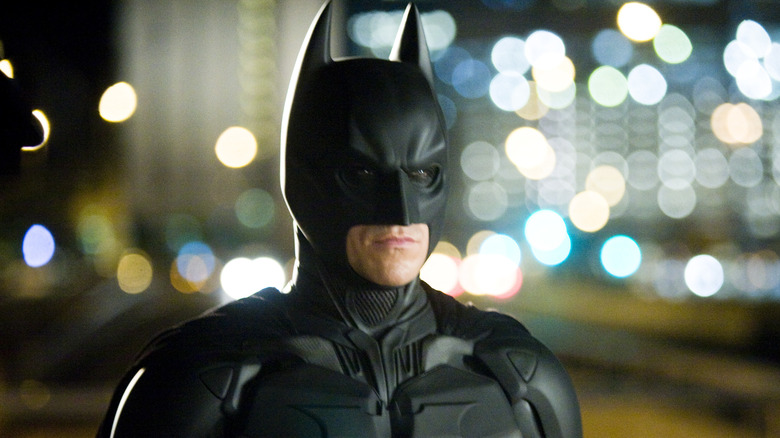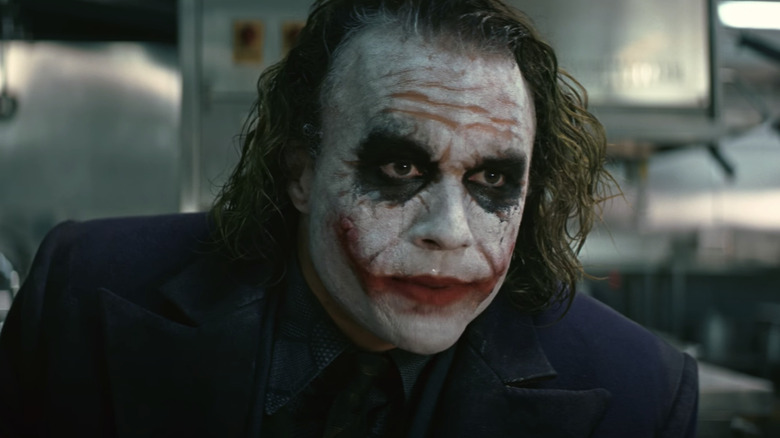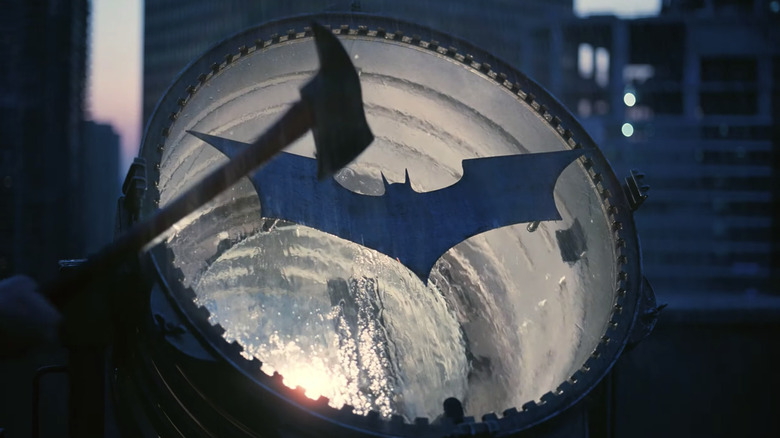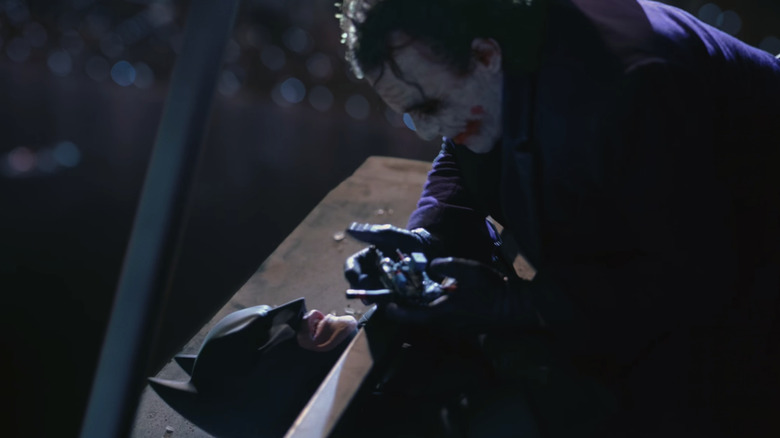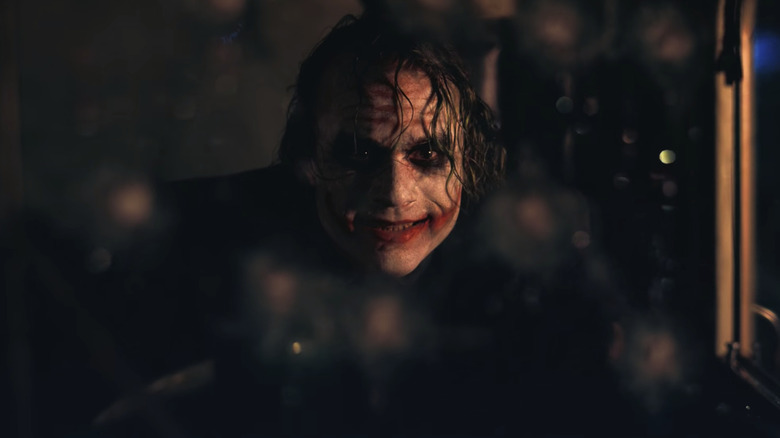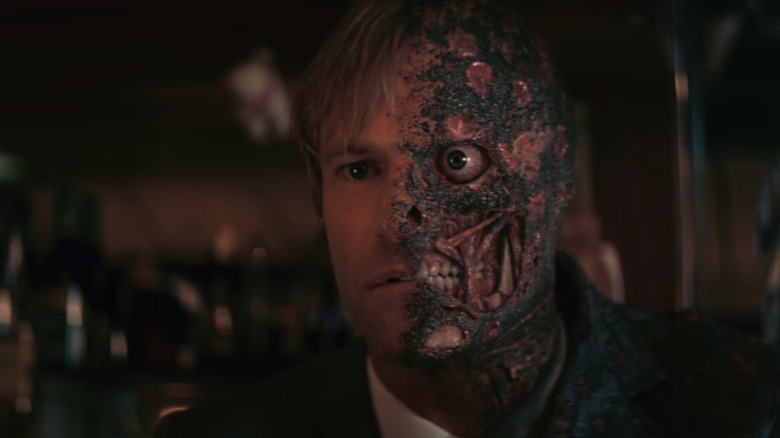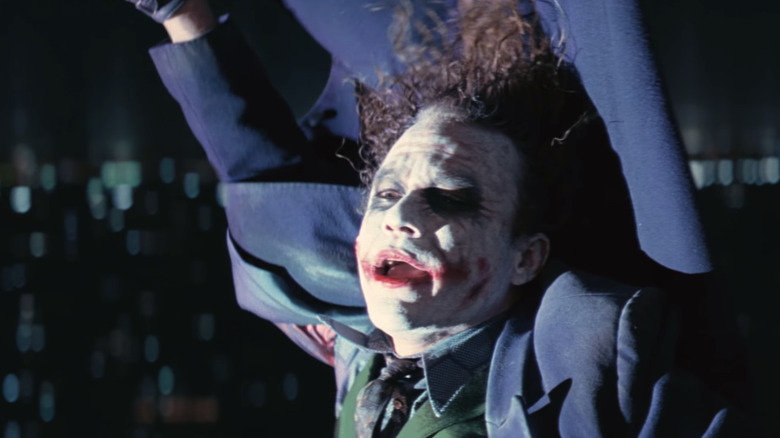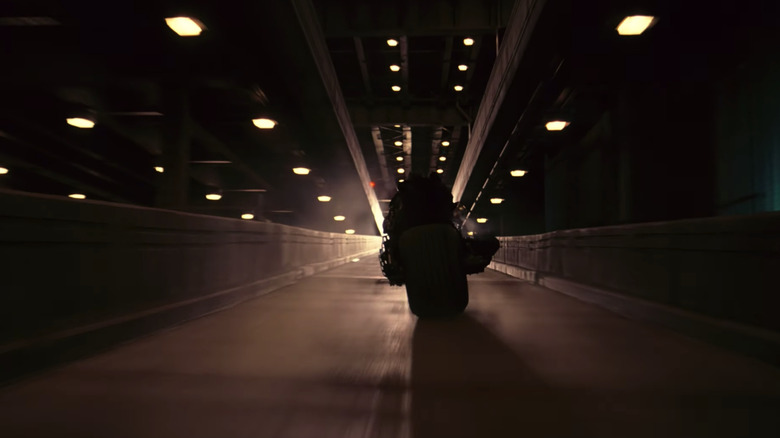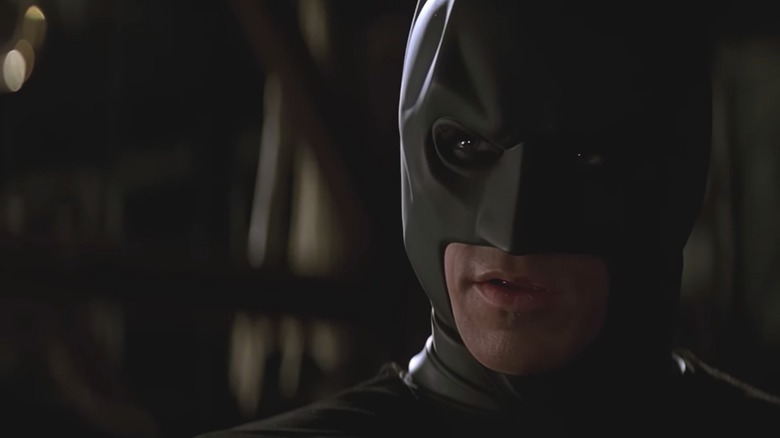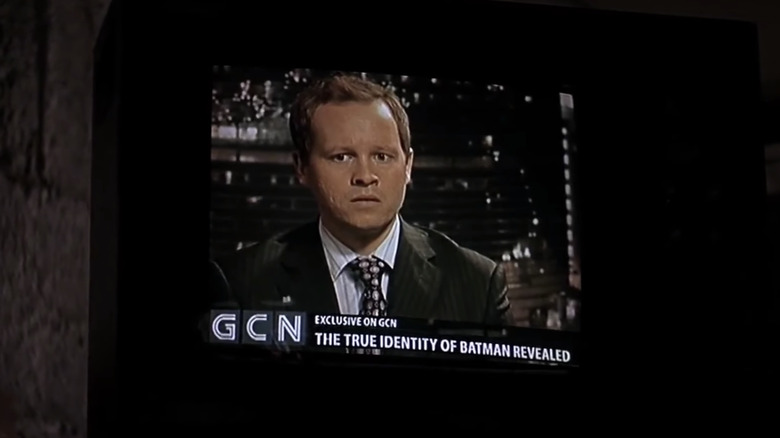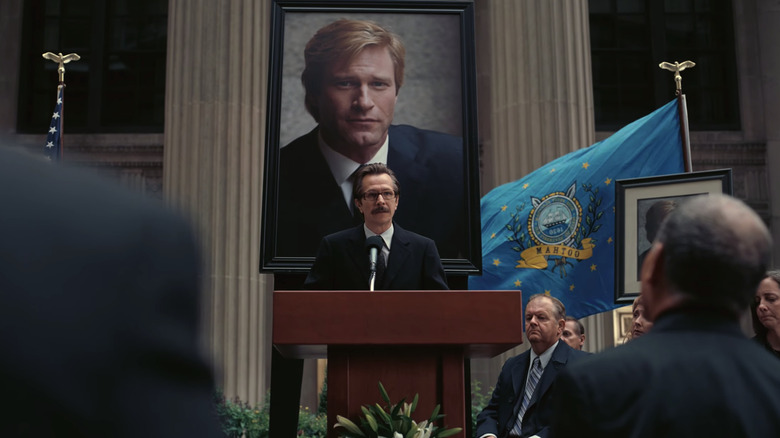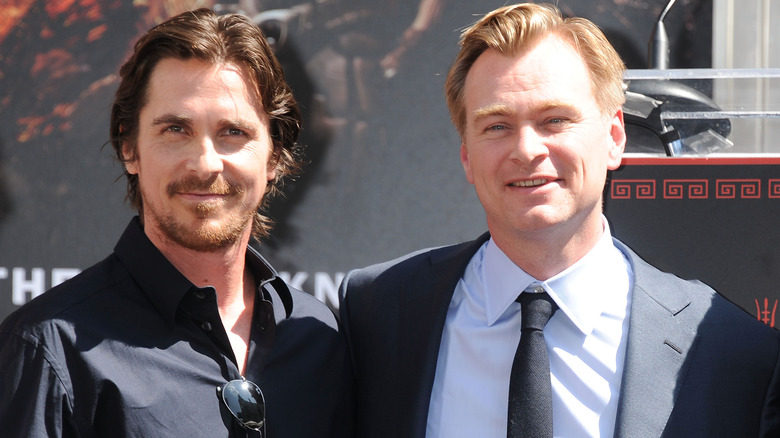The Ending Of The Dark Knight Explained
It's been 15 years since Christopher Nolan's "The Dark Knight" wowed audiences everywhere, and even after all these years, it's still the best live-action Batman movie to date. With masterful performances from Christian Bale, Heath Ledger, and Michael Caine, Batman's finest hour is a triumph of superhero media. While plenty have worn the cowl or the clown makeup since, Bale and Ledger's portrayals of Batman and the Joker are legendary, and continue to set the standard for what the Caped Crusader and the Clown Prince of Crime can be.
The second part in Nolan's famed "Dark Knight Trilogy" picks up not long after "Batman Begins," establishing that Batman has made himself a force to be reckoned with in Gotham City, planting fear into the hearts of criminals everywhere. But one of the big themes of Nolan's Batman movies is escalation, and since Batman is a step up from Gotham's finest, so too is the Joker the natural progression from the mob. And, of course, everything gets a bit more complicated when Rachel Dawes (now played by Maggie Gyllenhaal, replacing Katie Holmes) steps into the crossfire.
After all these years, it's easy to forget some of the most important aspects of "The Dark Knight" and wonder: wait, how did that movie end? Given that we've had over a decade to meditate on Nolan's superhero masterpiece, there are a few ideas that may be worth taking a second look at as we reexamine the ending of arguably Batman's darkest hour.
What you should remember about The Dark Knight
Starting about a year after "Batman Begins," we see that Batman's mission to clean up Gotham has been a relative success. After he's been on the street for months, Batman finally catches Jonathan Crane/Scarecrow (Cillian Murphy) and dissuades copycat crime fighters from their vigilantism. It's now that Bruce Wayne begins to see a possible life for himself outside of Batman, but Rachel has also moved on and is now dating the new D.A., Harvey Dent (Aaron Eckhart).
Working closely with Lt. Jim Gordon (Gary Oldman), Dent wants to take down the mob for good, and with Batman's help, the three of them nearly succeed. The mob goes underground, turning desperately to the Joker to kill Gotham's Caped Crusader. But things get more dangerous as the Joker threatens to kill Gothamites every day until Batman reveals his identity. After murdering a judge and the police commissioner, the clown guns for the mayor next, though Gordon saves his life and uses it as an opportunity to fake his own death. Convinced that Gordon is gone, Batman and Dent decide to take matters into their own hands.
Dent turns himself in as Batman before Bruce has the opportunity to, but that only leads Rachel to decisively choose Dent over Bruce. After a wild chase that involves Batman and Gordon saving Dent from the Joker, they capture the clown right as Dent and Rachel go missing.
What happened at the end of The Dark Knight?
After Batman saves Dent — now horribly scarred from an explosion — and Gordon fails to save Rachel, the Joker changes his tack. Now, he doesn't want Batman's identity revealed; instead, he wants to see Coleman Reese (Joshua Harto) — the man who believes he knows Batman's identity — dead, or else he'll blow up a hospital. This takes Joker to Gotham General, where he convinces Dent that the people responsible for Rachel's death and his injuries are actually Batman, Gordon, the Gotham police, and the mob. After Dent escapes, Joker blows up Gotham General.
Batman and Gordon struggle to find the Joker, who reveals his master plan. As Gotham is being evacuated on ferries, Joker explains that at midnight, one of the two boats will be blown up by the passengers on the other: one full of civilians, or one full of criminals. As Batman takes the Joker down, neither boat explodes, proving that the people of Gotham are better than the Joker thought they were. Although the Joker is again captured, the clown warns the Bat, "You and I are destined to do this forever."
Meanwhile, Dent — who has since killed cops and mobsters in his Two-Face persona — has kidnapped Gordon's family and wishes to inflict the same pain on him that he felt at Rachel's death. Thankfully, Batman arrives in time to save Gordon's son, though Dent dies as a result. To keep the peace in Gotham, Batman takes the fall for Dent's actions.
Batman and the Joker: two sides, same coin
The final moments between Batman and the Joker are revealing. As the Clown Prince shares with the Dark Knight his forecast for their future together, Batman proves that he'll always be there to stop him. From the beginning, Batman and the Joker are the perfect antithesis of one another. Batman frightens criminals through intimidation, while the Joker goes a step further and does the same to civilians and criminals alike through random acts of violence and murder.
Additionally, the Joker's true identity is unknowable. He has no fingerprints and no other alias, despite barely hiding his face under his clown makeup. He has multiple origin stories as well. This is in direct contrast to Batman's very discoverable secret identity. Like Harvey Dent's scarred coin, Batman and the Joker represent different sides of Gotham's escalation. While Bruce is relatively sane and inspires the people of Gotham to greater ideals, the Joker is the exact opposite: his insanity tears down heroes like Dent, corrupting their very souls.
This yin-and-yang between our titular hero and his nemesis is part of what makes "The Dark Knight" so compelling, and why the Batman/Joker dynamic is so often revisited. But at least in live-action, Christian Bale and Heath Ledger easily take the cake as the best representation of this iconic rivalry.
Could the Joker be ex-military?
One theory floating around the internet in recent years is that the Joker might be ex-military. For a lot of reasons, this actually makes perfect sense. The Joker knows how to use firearms, including a bazooka, he has plenty of experience rigging homemade explosives, and his "missions" often go off without a hitch. While the Clown Prince could just be incredibly intelligent, he also holds his own against cops, mobsters, and the Batman himself. That's no small feat for a crazed Gotham criminal. Remember, Scarecrow needed fear gas to even stand up to Batman.
Alongside his combat experience, the Joker is also a master of disguise. He goes undercover as a cop during Commissioner Loeb's (Colin McFarlane) funeral, pretends to be a nurse at Gotham General (though how nobody spots his makeup we'll never understand), and even infiltrates his own gang of bank-robbing clowns at the beginning of the movie. Though he claims not to be much of a planner, he's thought out every step of his schemes for Gotham so well that everything happens like clockwork.
Given the secrecy of the Joker's identity (which doesn't appear on any national database), it's possible that he was some sort of special agent or spy for the CIA, NSA, or some other national security agency that burned him. Maybe a disillusioned Joker lost his sanity and decided to wage a war of his own.
The fall of Gotham's white knight
For many, it seems like Harvey Dent's quick transition into Two-Face at the end of "The Dark Knight" is a bit unbelievable. Surely, even after the horrific tragedy that befalls him, Gotham's white knight wouldn't descend to the same level as the Joker so quickly? Well, Dent does fall, but it's possible that he fell long before he was scarred at the Joker's hand. No doubt, Dent's commitment to stopping the mob is admirable, but that doesn't mean he was always the best Gotham had to offer.
Though Batman calls Dent the best of them, he and Gordon are arguably more grounded morally. Gordon is known as a straight arrow in the GCPD, which is why Bruce trusts him in the first place, while Dent, on the other hand, is known as "Harvey Two-Face" by many of Gotham's finest from when he investigated their ranks at Internal Affairs.
In addition, following Gordon's apparent death, Dent interrogates paranoid schizophrenic Thomas Schiff (David Dastmalchian), threatening the Joker's henchman with a gun. Though Dent claims he never had any intention of hurting Schiff, these tactics may reveal his true colors. Naturally, by the time the Joker convinces Dent that Batman, Gordon and the police were responsible for Rachel's death, he wastes no time exacting his revenge. A frightening transition to be sure, but one we maybe should have seen coming. Two-Face, indeed.
Does the Joker win?
With Harvey Dent's fall into madness, it's easy to think that the Joker wins in the end. After all, Batman is forced underground, and while trying to save Gordon's son, he inadvertently kills Two-Face, thus breaking his "one rule." So, Joker wins, right? Well, it's not really that simple. Besides the fact that killing Two-Face isn't really intentional and is meant to save a life rather than take one (not vengefully, as the Joker wanted), our villain wants to prove that all of Gotham can fall too. Thankfully, the deranged clown fails miserably.
When given the choice between their lives and the lives of criminals, the people of Gotham are unable to blow up the convicts on the other ferry in order to save themselves. But the prisoners don't blow up the other boat either, and one in particular (Tom "Tiny" Lister Jr.) even throws the detonator overboard in protest.
None of them wish to sink to the same lows as the Joker, even if it costs them their lives. In that, the Joker not only fails, but Batman wins. He (along with Dent) have truly inspired the people of Gotham to take a stand against crime, no matter what the personal cost.
Why did Batman have to run?
Perhaps the most shocking aspect of the ending of "The Dark Knight" is that Batman takes the fall for Harvey Dent's crimes so that the criminals of Gotham may stay securely in their cells. It's a hard pill to swallow, especially since Dent's legacy is ultimately based on a lie (which is further explored in "The Dark Knight Rises"), but that isn't even the worst of it. Batman, who has worked hard to gain the trust of the people of Gotham and inspired them to better ideals, is now seen as a traitor and a murderer, tarnishing his reputation for years to come.
But Batman has to run. In taking the fall for Two-Face, Batman not only protects Dent's legacy, but becomes the scapegoat for all of Gotham's pain. In choosing not to be the hero (just as he did earlier by letting Dent take the fall for him), Batman is able to accomplish more good for the city than he could if he'd let Two-Face's actions mess with his previous criminal convictions. After all, as Dent tells Mayor Anthony Garcia (Néstor Carbonell) early on, 18 months of clean streets for Gotham could be a game-changer.
So with the Joker behind bars and the mob in there with him, Bruce was able to step away from Batman, and Batman from Gotham. Though this isn't a permanent fix, it helps Gotham to heal and become a much safer place.
'He's the hero Gotham deserves, but not the one it needs'
Gordon's final monologue in "The Dark Knight" is arguably one of the most important moments in the film. It marks Batman's final transition from hero to supposed villain in the eyes of Gotham, and though it isn't right or fair, it's necessary. As Batman says, he's whatever Gotham needs him to be, and right now, to keep Gotham safe, he needs to be the bad guy so that the people who believed in Harvey Dent might continue to believe in a better Gotham.
Gordon's words remind us that, though Batman is Gotham's greatest hero, his prolonged absence might be what's best for the city in light of the Joker's schemes. In a way, Batman as Gotham's deserved hero is a double-edged sword. On one hand, Batman has given his all to the city. He's a citizen who has stood up to crime and fought to keep people safe. But on the other hand, he's a masked vigilante who hides his identity from the very people he's sworn to protect.
It's this very secret that allows Batman to take the fall. Since his identity is secure, Bruce Wayne can continue to help Gotham even if Batman can't. Gordon's hunch is right: Batman does continue to watch over the city as a silent guardian, and eventually, he'll return just when Gotham needs him most.
Is Batman's secret identity still safe?
In "The Dark Knight," an accountant named Coleman Reese, working with Lucius Fox (Morgan Freeman) on a Wayne Enterprises deal with the Hong Kong-based Lao (Chin Han), accidentally discovers the identity of Batman. Or at least he thinks he does. In going back over the books, Reese connects the Batmobile to Wayne Enterprises' Tumbler before attempting to blackmail Fox with the information. While Fox wards him off for a time, Reese steps up to reveal Batman's identity to the public after the Joker issues his threats.
Though Joker changes his plans, Reese still knows Batman's identity, and it's entirely plausible that, given how the film ends, he would reveal that information to Gotham's police department following Batman's supposed criminal activity. Except, as far as we know, he doesn't. After Gothamites attempt to murder Reese following Joker's threats to blow up a hospital, Bruce puts himself between Reese and death, crashing his car to keep the accountant safe. It's here that Bruce and Reese make eye contact, and Reese recognizes that Bruce is a hero.
Likely feeling indebted to Bruce, and in turn Batman, Reese apparently keeps quiet about what he knows from then on. Though one might wonder if the GCPD attempts to get the information out of Reese following Harvey Dent's death, the Wayne accountant never reveals Batman's identity publicly, which we know for sure from "The Dark Knight Rises."
What the end of The Dark Knight meant for Nolan's Batman trilogy
The massive success of "The Dark Knight" meant that director Christopher Nolan was given the chance to round out his Batman trilogy with 2012's "The Dark Knight Rises." Though released only four years later, "Rises" actually takes place eight years after the events of the 2008 blockbuster. Tragically, Heath Ledger's death prior to the release of "The Dark Knight" release meant that Nolan was unable to use the Joker in the long-anticipated follow-up, but he made do with Tom Hardy's Bane, who has since become one of the most beloved villains in Batman's live-action rogues gallery.
Following "The Dark Knight," the Dent Act is passed in Gotham, which allows GCPD to be tougher on criminals, especially vigilantes. Batman goes into hiding, and Commissioner Gordon works tirelessly to make his city a safer place for his family, who sadly leave him after being unable to live with the lie that Harvey Dent was a hero. This all comes back to bite Gordon when Bane reads his confession publicly, revealing that Two-Face had tried to kill Gordon's family.
With Bane's arrival in Gotham, Bruce returns to active duty as Batman and fights one final time to save his city. This time around, Bruce is shown to walk with a limp following his fall at the end of "The Dark Knight," although that's nothing that Lucius Fox's Wayne tech can't fix.
Could Christian Bale's Batman ever return?
Following "The Dark Knight Trilogy," many wondered if Christian Bale would ever return as Batman. In the years following 2013's "Man of Steel" (produced by Christopher Nolan), there were rumors that Zack Snyder's follow-up would co-star an older Batman, which many assumed might be Bale's version of the Dark Knight. However, when Ben Affleck was cast for 2016's "Batman v Superman: Dawn of Justice," those rumors ceased. Affleck was DC's primary Batman through 2023's "The Flash," with Robert Pattinson playing the role in 2022's "The Batman."
But with all the recent shake-ups over at DC Studios, Bale's Batman has once again been on people's minds. When asked if he would ever return, Bale had this to say. "I had a pact with Chris Nolan. In my mind, it would be something if [Nolan] ever said to himself, 'You know what, I've got another story to tell.' And if he wished to tell that story with me, I'd be in." Since "The Dark Knight Trilogy," Bale has largely avoided superhero movies, with the exception being Marvel Studios' critically panned "Thor: Love and Thunder."
Likewise, Nolan too has avoided superhero flicks, instead focusing on original stories like "Interstellar" and "Tenet," or historical dramas such as "Dunkirk" and "Oppenheimer." He did, however, executive produce all three of Zack Snyder's DCEU installments, including the famed "Zack Snyder's Justice League." Who knows, maybe Nolan and his Batman could one day return, no matter how unlikely it seems.
